【课堂新坐标】2016届高考英语总复习(人教版,全国通用)语法专项突破:连词和状语从句(共52张PPT)
文档属性
| 名称 | 【课堂新坐标】2016届高考英语总复习(人教版,全国通用)语法专项突破:连词和状语从句(共52张PPT) |  | |
| 格式 | zip | ||
| 文件大小 | 25.4KB | ||
| 资源类型 | 教案 | ||
| 版本资源 | 人教版(新课程标准) | ||
| 科目 | 英语 | ||
| 更新时间 | 2015-08-12 09:24:51 | ||
图片预览

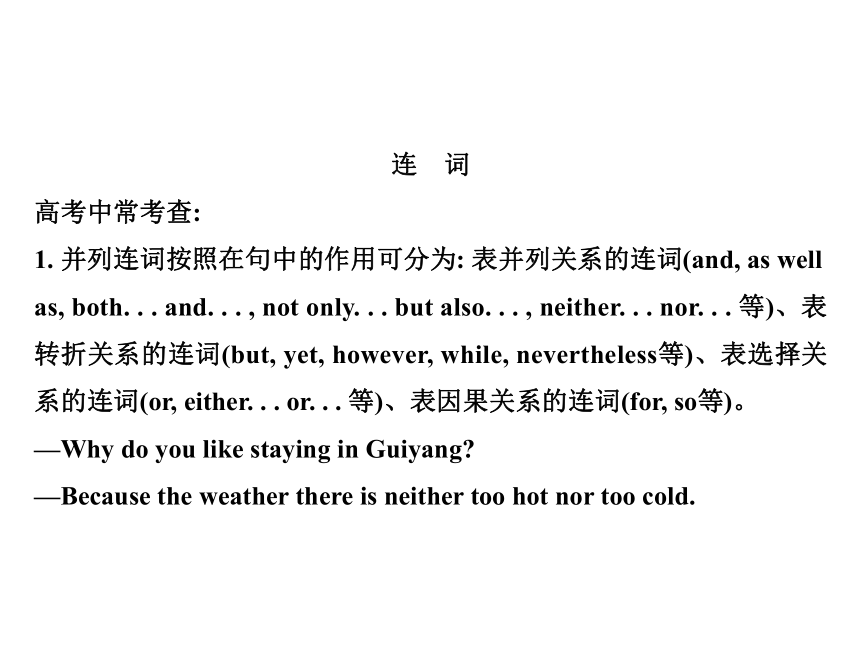
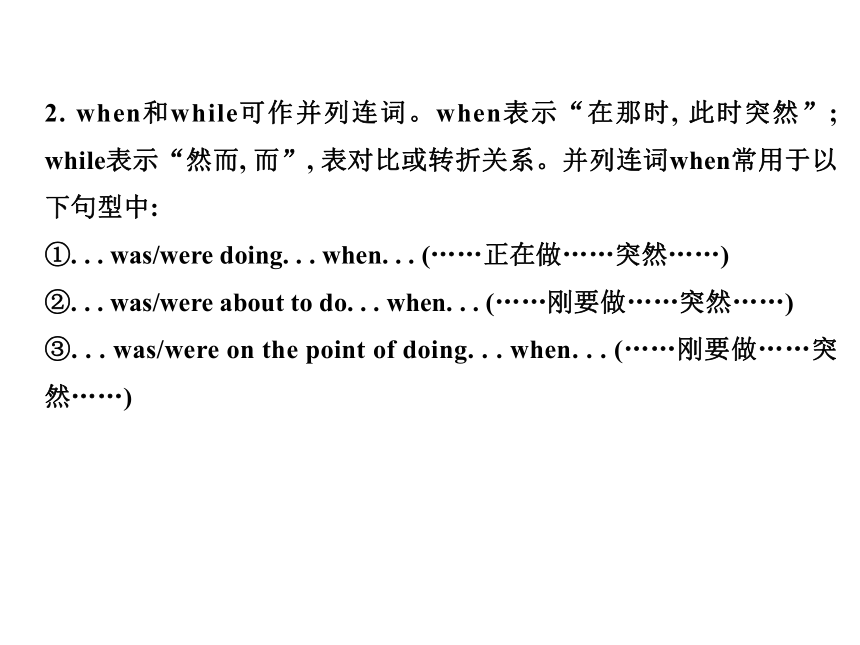
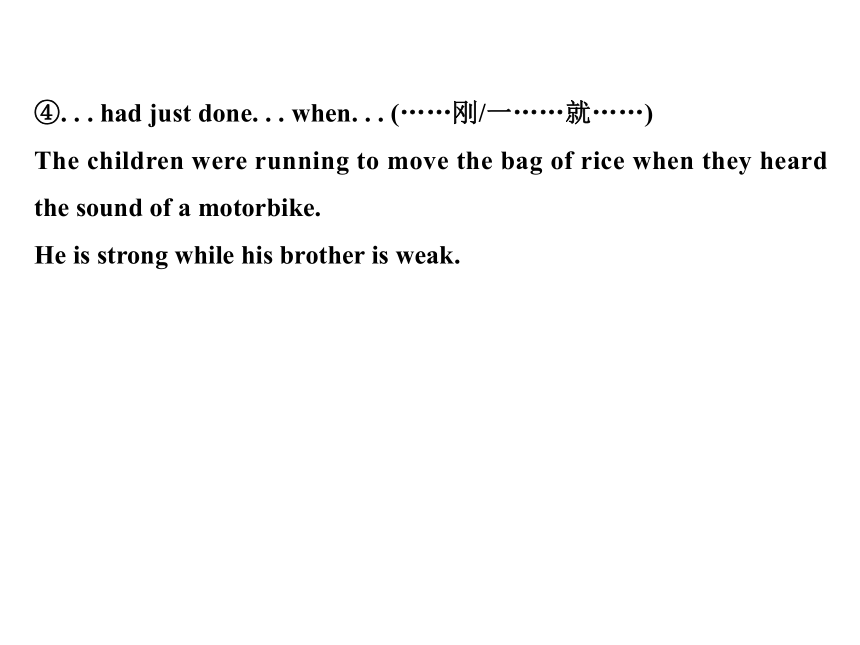
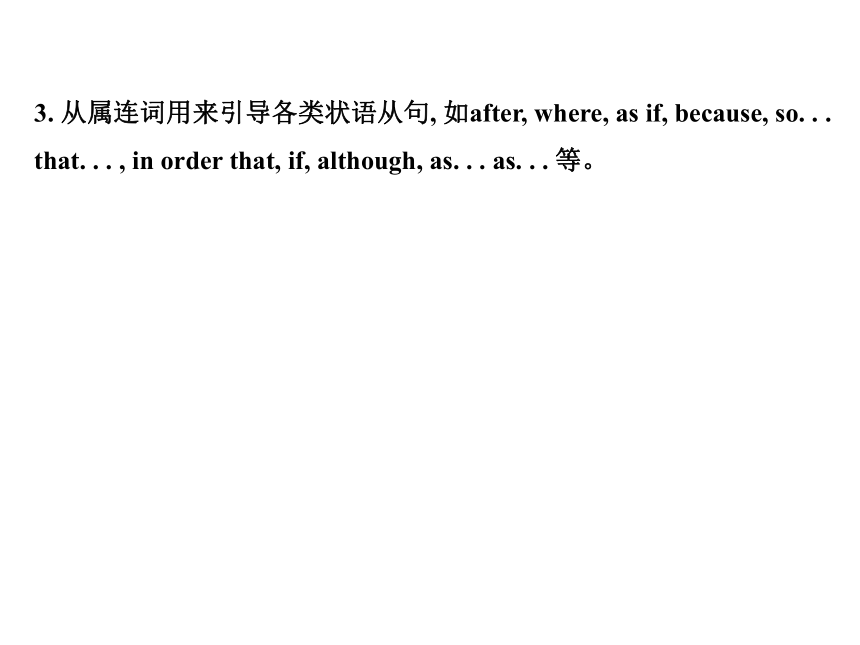
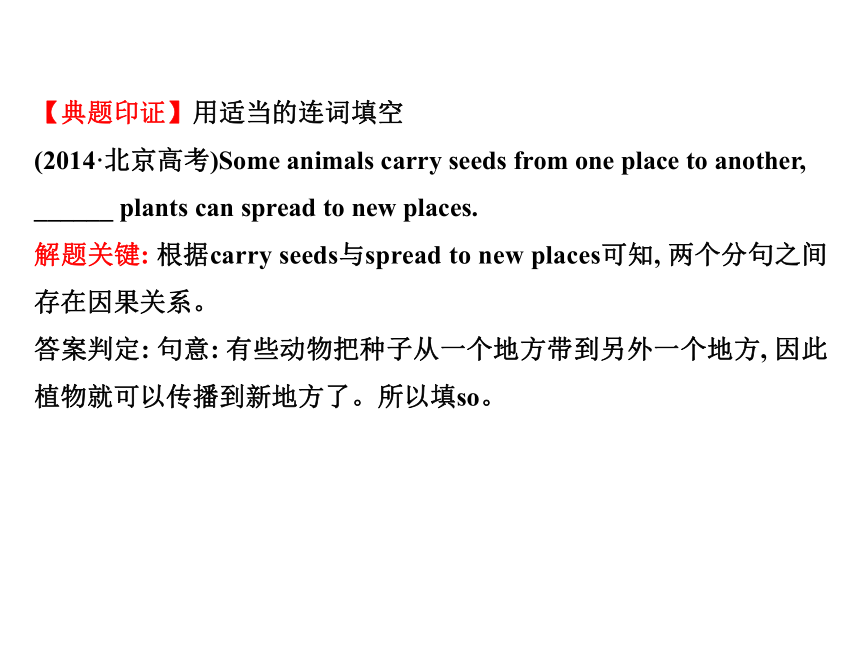
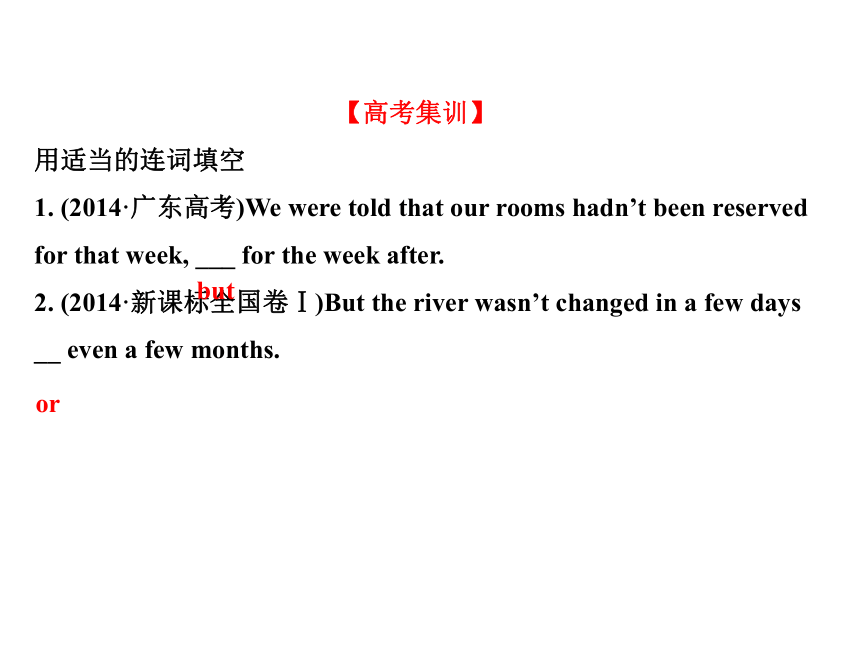
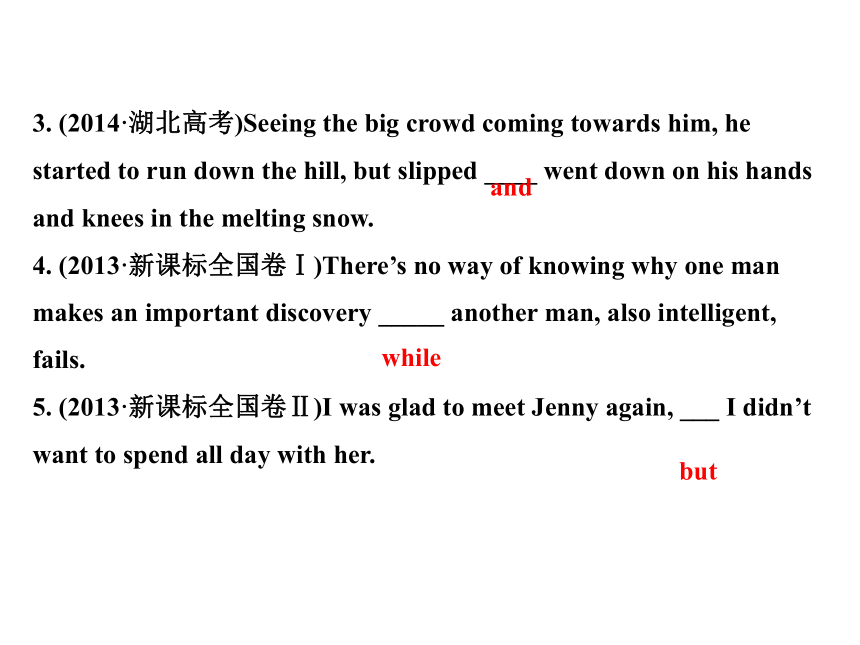
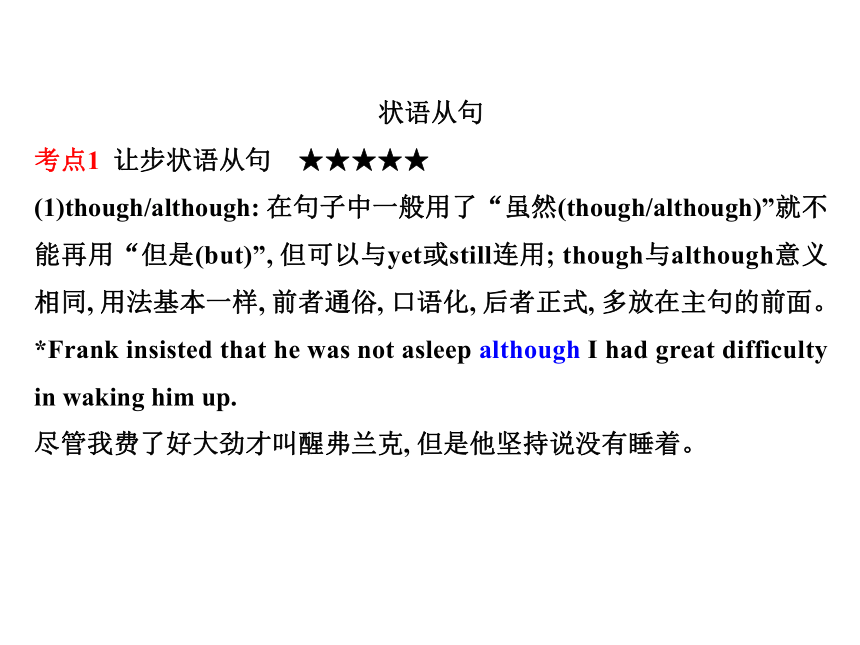
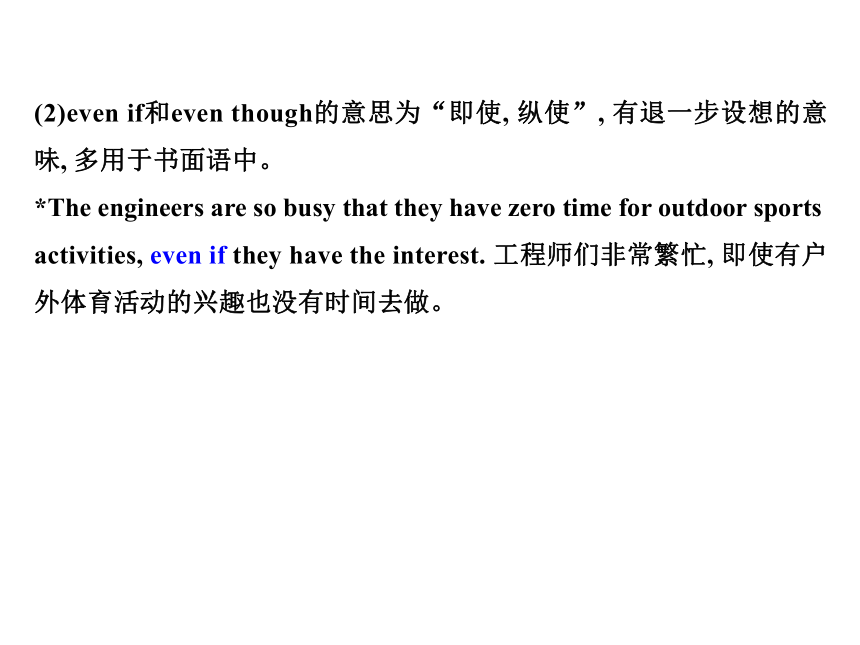
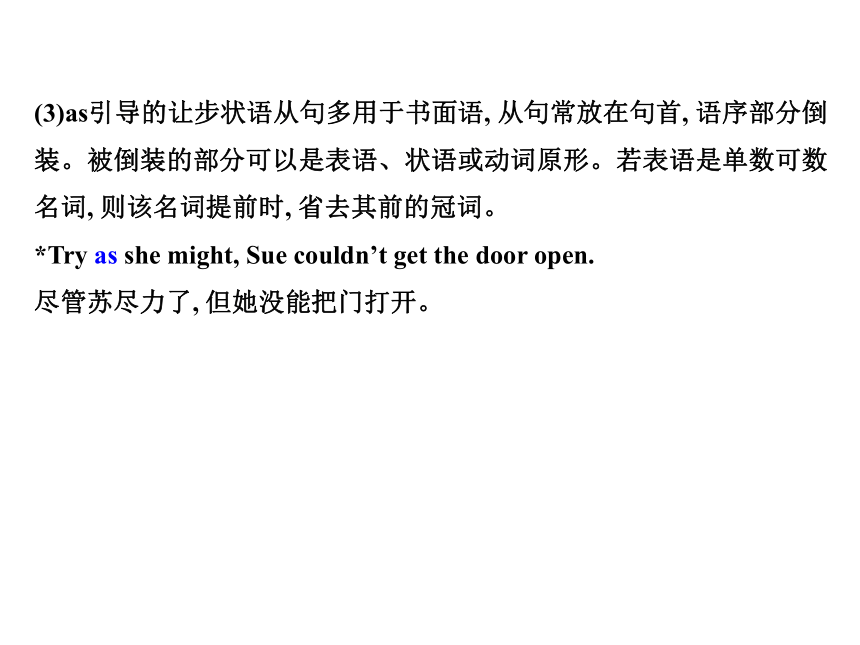
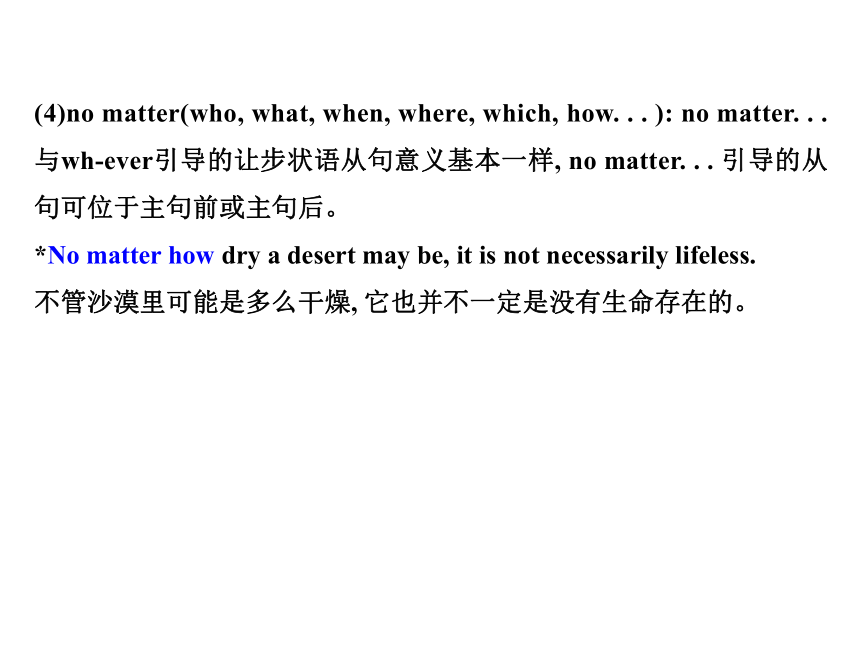
文档简介
课件52张PPT。语法专项突破系列
连词和状语从句连 词
高考中常考查:
1. 并列连词按照在句中的作用可分为: 表并列关系的连词(and, as well as, both. . . and. . . , not only. . . but also. . . , neither. . . nor. . . 等)、表转折关系的连词(but, yet, however, while, nevertheless等)、表选择关系的连词(or, either. . . or. . . 等)、表因果关系的连词(for, so等)。
—Why do you like staying in Guiyang?
—Because the weather there is neither too hot nor too cold. 2. when和while可作并列连词。when表示“在那时, 此时突然”; while表示“然而, 而”, 表对比或转折关系。并列连词when常用于以下句型中:
①. . . was/were doing. . . when. . . (……正在做……突然……)
②. . . was/were about to do. . . when. . . (……刚要做……突然……)
③. . . was/were on the point of doing. . . when. . . (……刚要做……突然……)④. . . had just done. . . when. . . (……刚/一……就……)
The children were running to move the bag of rice when they heard the sound of a motorbike.
He is strong while his brother is weak. 3. 从属连词用来引导各类状语从句, 如after, where, as if, because, so. . . that. . . , in order that, if, although, as. . . as. . . 等。【典题印证】用适当的连词填空
(2014·北京高考)Some animals carry seeds from one place to another, ______ plants can spread to new places.
解题关键: 根据carry seeds与spread to new places可知, 两个分句之间存在因果关系。
答案判定: 句意: 有些动物把种子从一个地方带到另外一个地方, 因此植物就可以传播到新地方了。所以填so。 【高考集训】
用适当的连词填空
1. (2014·广东高考)We were told that our rooms hadn’t been reserved
for that week, ___ for the week after.
2. (2014·新课标全国卷Ⅰ)But the river wasn’t changed in a few days
__ even a few months. butor3. (2014·湖北高考)Seeing the big crowd coming towards him, he
started to run down the hill, but slipped ____ went down on his hands
and knees in the melting snow.
4. (2013·新课标全国卷Ⅰ)There’s no way of knowing why one man
makes an important discovery _____ another man, also intelligent,
fails.
5. (2013·新课标全国卷Ⅱ)I was glad to meet Jenny again, ___ I didn’t
want to spend all day with her. andwhilebut状语从句
考点1 让步状语从句 ★★★★★
(1)though/although: 在句子中一般用了“虽然(though/although)”就不能再用“但是(but)”, 但可以与yet或still连用; though与although意义相同, 用法基本一样, 前者通俗, 口语化, 后者正式, 多放在主句的前面。
*Frank insisted that he was not asleep although I had great difficulty in waking him up.
尽管我费了好大劲才叫醒弗兰克, 但是他坚持说没有睡着。(2)even if和even though的意思为“即使, 纵使”, 有退一步设想的意味, 多用于书面语中。
*The engineers are so busy that they have zero time for outdoor sports activities, even if they have the interest. 工程师们非常繁忙, 即使有户外体育活动的兴趣也没有时间去做。(3)as引导的让步状语从句多用于书面语, 从句常放在句首, 语序部分倒装。被倒装的部分可以是表语、状语或动词原形。若表语是单数可数名词, 则该名词提前时, 省去其前的冠词。
*Try as she might, Sue couldn’t get the door open.
尽管苏尽力了, 但她没能把门打开。(4)no matter(who, what, when, where, which, how. . . ): no matter. . . 与wh-ever引导的让步状语从句意义基本一样, no matter. . . 引导的从句可位于主句前或主句后。
*No matter how dry a desert may be, it is not necessarily lifeless.
不管沙漠里可能是多么干燥, 它也并不一定是没有生命存在的。(5)wh-ever(whatever/whoever/whenever/wherever/whichever);
however。
①wh-ever从句中的动词有时可以和may连用;
②wh-ever可引导让步状语从句和名词性从句, no matter. . . 只能引导让步状语从句。
*To show our respect, we usually have to take our gloves off whoever we are to shake hands with.
不论我们和谁握手, 为了表示尊敬, 我们通常要摘掉手套。(6)while也可以引导让步状语从句, 意为“虽然”。
*While volleyball is her main focus, she’s also good at basketball.
尽管排球是她主要的项目, 她也很擅长篮球。【点津】让步状语从句中的主语和主句主语一致, 或从句主语为it, 而且从句的谓语又包含be动词, 则可以把从句主语和be动词省略。【典题印证】用适当的连词填空
(2014·北京高考) the forest park is far away, a lot of tourists visit it every year.
解题关键: 搞清主从句之间的关系, “far away”与“visit it every year”是转折关系, 故可填as或even though。as引导让步状语从句时从句需要用倒装结构; even though相当于even if, 意为“尽管, 虽然”, 引导让步状语从句。根据the forest park is far away是正常语序, 并未用倒装结构可知, even though符合句意和语法结构。注意首字母应大写。 【高考集训】
用适当的连词填空
1. (2013·辽宁高考)One can always manage to do more things, no
matter ____ full one’s schedule is in life.
2. (2013·天津高考)________________ small, the company has about
1, 000 buyers in over 30 countries.
3. (2013·四川高考)He is so busy. He cannot afford enough time with
his son ______he wants to. howAlthough/Thougheven if4. (2013·上海高考)They promised to develop a software package by
the end of this year, ________ difficulty they might have.
5. (2012·陕西高考)Hot _________ the night air was, we slept deeply
because we were so tired after the long journey. whateveras/though考点2 时间状语从句 ★★★★
(1)when指的是“某一具体的时间”, 从句中谓语动词是延续性或非延续性的。
*When I came into the room, he was writing a letter.
当我走进房间时, 他正在写信。
(2)whenever指的是“在任何一个不具体的时间”。
*You can ask for help whenever you need it.
你如果需要帮助请随时提出来。(3)while指“在某一段时间里”, “在……期间”, while引导的动作必须是持续性的。
*Mary made coffee while her guests were finishing their meal.
当客人们将要结束用餐的时候玛丽冲完了咖啡。
(4)as(一边……一边)引导持续性动作, 强调主句和从句的动作同时发生。
*He hurried home, looking behind as he went.
他急忙赶回家, 边走边回头看。(5)before意为“在……之前, 在……之后才, 不等……就”。
*The girl had hardly rung the bell before the door was opened suddenly, and her friend rushed out to greet her. 女孩还没来得及按门铃, 门就突然打开了。她的朋友跑出来迎接她。
(6)after意为“在……之后”。
*Several years after they’d split up they met again by chance in Beijing. 他们分手几年以后在北京又偶然相遇。(7)till/until: 如果主句动词是延续性动词, 常用肯定式, 表示“直到……为止”; 如果主句动词是瞬间性动词, 要用否定式, 表示“直到……才”“在……以前不”, 从句放在句首表示强调, 一般用until。
*If a lot of people say a film is not good, I won’t bother to see it, or I’ll wait until it comes out on DVD.
如果许多人都说一部电影不好的话, 我不会费心去观看, 或者我将一直等到DVD版本的电影出版。(8)since引导的时间状语从句用一般过去时, 谓语通常是短暂性动词, 主句用现在完成时。
*I have been teaching here since I left college.
自从我大学毕业后, 我就一直在此教学。(9)as soon as/hardly. . . when/no sooner. . . than/the moment/the instant/the second/immediately/directly/instantly: hardly. . . when和no sooner. . . than的意义相当于as soon as, 但只表示过去发生的事情, 主句为过去完成时, 从句为过去时, 如hardly或no sooner位于句首时语气强, 而且主句的谓语要用部分倒装。*Just use this room for the time being, and we’ll offer you a larger one as soon as it becomes available.
仅暂时使用此房间, 一旦有了大的, 我们就提供给你一个。
*He had no sooner finished his speech than the students started cheering.
他一完成演讲学生们就开始欢呼起来了。(10)every time/each time/last time/next time/by the time: 在时间状语从句中, 不能用将来时或过去将来时, 而要用一般现在时或一般过去时代替将来时。
*Next time you come here, I will tell you.
下次你来这里, 我会告诉你的。【点津】时间状语从句的3个重点句型
(1)It will be. . . before. . . 过多久才……
*It will be long before they come back. 他们很久才能回来。
(2)It won’t be. . . before. . . 不久就……
*John thinks it won’t be long before he is ready for his new job.
约翰觉得不会过很久他就能为新工作作好准备。(3)It is/has been. . . since. . . 自从……以来……时间
注意: since引导的从句如果用瞬间性动词, 表示的时间是从谓语动作算起; 如果用延续性动词表示的时间是从动作或状态的结束算起。
*It has been a decade since he joined the club.
他加入俱乐部已10年了。(从加入俱乐部后算起)
*It is two years and a half since he was an ambassador to France. 他不担任驻法大使已两年半了。(从不再担任大使算起)【点津】在时间状语从句中, 如果从句的主语和主句的主语一致, 或从句的主语为it, 并且从句的谓语又包含be动词, 则从句的主语和be动词可以省略。【典题印证】用适当的连词填空
(2014·安徽高考)The meaning of the word“nice”changed a few times ________ it finally came to include the sense“pleasant. ”
解题关键: 根据finally可知, came to include the sense“pleasant”后于The meaning of the word“nice”changed a few times发生, 据此可判断连词。
答案判定: 句意: “nice”一词的含义变化了数次, 直到最后它才包括了“pleasant”的含义。在nice包括pleasant这一含义之前, 其含义还有其他几次演变。所以填before。 【高考集训】
用适当的连词填空
1. (2014·陕西高考)The young couple, who returned my lost wallet, left
______ I could ask for their names.
2. (2014·江西高考)It was the middle of the night _____ my father woke
me up and told me to watch the football game. beforewhen3. (2014·天津高考)_____ you start eating in a healthier way, weight
control will become much easier.
4. (2013·陕西高考)I have heard a lot of good things about you _____ I
came back from abroad.
5. (2012·山东高考)He smiled politely __ Mary apologized for her
drunken friends. Oncesinceas考点3 地点状语从句和条件状语从句 ★★★
1. 地点状语从句常考查:
(1)where与wherever意义基本相同, 但后者语气较强, 多用于书面语。
*Today, we will begin where we stopped yesterday so that no point will be left out.
今天, 为了不遗漏要点, 我们从昨天结束的地方开始。
*You can put the book wherever you like.
你可以把书放在任意一个你喜欢的地方。(2)地点状语从句在句首时常兼有抽象条件意味。
*Where there’s a will, there’s a way.
有志者事竟成。【点津】where引导的状语从句和定语从句的区别。
where引导地点状语从句直接修饰动词, 而在定语从句中where作为关系副词要跟在表示地点的先行词后面, 即此时有明显的地点名词。
*When solving the problem a second time, you’d better be more careful where you made a mistake.
=When solving the problem a second time, you’d better be more careful in the place where you made a mistake.
当你第二次解决这个问题的时候, 你最好在出过差错的地方更加小心。2. 条件状语从句常用引导词: if/unless/as long as/so long as/in case/so far as/as far as。
(1)unless从句的谓语只能用肯定式; unless和if. . . not同义, unless是书面语, if. . . not是口语, 二者通常可以换用。
*The little boy won’t go to sleep unless his mother tells him a story. 除非他的妈妈给他讲故事, 否则这个小男孩是不会睡觉的。(2)条件状语从句中的谓语动词的时态一般要用现在时或过去时代替一般将来时或过去将来时。
*So long as you work hard, you will succeed.
只要努力工作, 你就会成功。【点津】在条件状语从句中, 从句的主语和主句主语一致, 或从句的主语为it, 而且从句的谓语又包含be动词, 就可以省略从句中的主语和be动词。【典题印证】用适当的连词填空
(2014·重庆高考)Half an hour later, Lucy still couldn’t get a taxi ______ the bus had dropped her.
解题关键: 把握所填空前后的关系, 从couldn’t get a taxi与the bus had dropped her的逻辑关系上看应表示地点。
答案判定: 句意: 半小时后, 露西仍然没有从下公交车的地方打到出租车。所以用where。 【高考集训】
用适当的连词填空
1. (2014·辽宁高考)__ you don’t mind, I’ll stop and take a deep breath.
2. (2014·湖南高考)You will never gain success ______ you are fully
devoted to your work.
3. (2013·上海高考)I cannot hear the professor clearly as there is too
much noise ______ I am sitting. Ifunlesswhere考点4 其他状语从句 ★★
1. 目的状语从句。
(1)so that/in order that引导的目的状语从句中需用情态动词can, could等。
*The police officers in our city work hard in order that the rest of us can live a safe life.
为了其余人能过上安全的生活, 我们城市的警察工作很努力。
(2)in order that引导的从句可位于主句之前或之后, so that引导的从句只能位于主句之后。 (3)for fear that(唯恐, 以防)与in case所引导的目的状语从句中, 谓语动词有时也用should/might/could+动词原形。
*The boy hid himself behind the tree for fear that his father might see him.
男孩藏在树后以防他父亲看见他。
*Take your umbrella in case it should rain.
带上雨伞以防下雨。【点津】in case当“万一, 如果”讲时, 引导条件状语从句。
*In case that he leaves, please inform me.
如果他离开, 请通知我。(4)目的状语从句可以用so as to, in order to等不定式代替, 但主句和从句的主语必须一致。
*He got up early in order that he could catch the early bus.
=He got up early so as to/in order to catch the early bus.
他早起是为了赶上早班车。2. 结果状语从句。
(1)so that前有逗号, 引导结果状语从句。
*We turned up the radio, so that everyone heard the news.
我们开大了收音机的音量, 结果每个人都听到了新闻。
(2)so. . . that中so后面跟形容词或副词。
*He was so excited that he couldn’t say a word.
他如此兴奋以至于说不出话来。(3)such. . . that中such后面跟名词, 如果名词是单数就要用such a/an. . . that, 还可以转换用so. . . that, 语气较强。
*Jack is so honest a worker that we all believe him.
=Jack is such an honest worker that we all believe him.
杰克是位诚实的工人, (以至于)我们大家都相信他。3. 原因状语从句。
(1)because用来回答why的提问, 语气最强, 一般放在主句之后。
*The old man asked Lucy to move to another chair because he wanted to sit next to his wife.
这位老人叫露西挪到另一把椅子上因为他想跟他妻子挨着坐。
(2)since表示既然或已知的理由, 稍加分析即可表明的原因, 多放句首。
*Since everyone is here, let’s begin our meeting.
既然大家都到了, 我们就开始开会吧。(3)as引导的从句常放在句首, 说明次要的原因, 主句说明结果, 常用于口语中(注意比较: for连接的是并列句)。
*As he didn’t know much English, he looked up the word in the dictionary.
由于他不太懂英语, 所以在词典中查了那个单词。
(4)considering that, seeing that, now that和since意义相似, 都有“鉴于某个事实”的意思, that可以省去。
*He finished his task very well, considering that it was quite different.
鉴于这项任务相当特殊, 他完成得很不错。4. 方式状语从句。
(1)as引导状语从句, 意为“按照”。
*Do as you are told to.
按照你被告知的那样去做。
(2)as if或as though的意义和用法基本一样; 从句中可以用陈述语气表示可能符合事实, 也可以用虚拟语气表示与事实相反。
*Jack wasn’t saying anything but the teacher smiled at him as if he had done something very clever.
杰克没说一句话, 但老师却对着他微笑, 好像他做了什么聪明事似的。5. 比较状语从句。
(1)as. . . as; not so/as. . . as; the same. . . as
连词表示同程度级的比较, 肯定句用as. . . as, 否定句可用not as. . . as或not so. . . as。
*He doesn’t run so/as fast as Jack(does).
他跑得不如杰克快。
(2)than表示不同程度的比较, 主句中用形容词或副词的比较级。
*He runs less fast than me. 他跑得不如我快。【典题印证】用适当的连词填空
(2014·浙江高考)Cathy had quit her job when her son was born _____ she could stay home and raise her family.
解题关键: 由关键信息quit her job以及stay home and raise her family可知, stay home and raise her family是辞职的目的。
答案判定: 句意: 当儿子出生时凯茜就已辞去了工作, 以便她能够待在家里抚养孩子。所以填so that。so that引导目的状语从句, “以便”。 【高考集训】
用适当的连词填空
1. (2013·山东高考)Mark needs to learn Chinese _____ his company is
opening a branch in Beijing.
2. (2012·重庆高考)—Coach, can I continue with the training?
—Sorry, you can’t __ you haven’t recovered from the knee injury. sinceas
连词和状语从句连 词
高考中常考查:
1. 并列连词按照在句中的作用可分为: 表并列关系的连词(and, as well as, both. . . and. . . , not only. . . but also. . . , neither. . . nor. . . 等)、表转折关系的连词(but, yet, however, while, nevertheless等)、表选择关系的连词(or, either. . . or. . . 等)、表因果关系的连词(for, so等)。
—Why do you like staying in Guiyang?
—Because the weather there is neither too hot nor too cold. 2. when和while可作并列连词。when表示“在那时, 此时突然”; while表示“然而, 而”, 表对比或转折关系。并列连词when常用于以下句型中:
①. . . was/were doing. . . when. . . (……正在做……突然……)
②. . . was/were about to do. . . when. . . (……刚要做……突然……)
③. . . was/were on the point of doing. . . when. . . (……刚要做……突然……)④. . . had just done. . . when. . . (……刚/一……就……)
The children were running to move the bag of rice when they heard the sound of a motorbike.
He is strong while his brother is weak. 3. 从属连词用来引导各类状语从句, 如after, where, as if, because, so. . . that. . . , in order that, if, although, as. . . as. . . 等。【典题印证】用适当的连词填空
(2014·北京高考)Some animals carry seeds from one place to another, ______ plants can spread to new places.
解题关键: 根据carry seeds与spread to new places可知, 两个分句之间存在因果关系。
答案判定: 句意: 有些动物把种子从一个地方带到另外一个地方, 因此植物就可以传播到新地方了。所以填so。 【高考集训】
用适当的连词填空
1. (2014·广东高考)We were told that our rooms hadn’t been reserved
for that week, ___ for the week after.
2. (2014·新课标全国卷Ⅰ)But the river wasn’t changed in a few days
__ even a few months. butor3. (2014·湖北高考)Seeing the big crowd coming towards him, he
started to run down the hill, but slipped ____ went down on his hands
and knees in the melting snow.
4. (2013·新课标全国卷Ⅰ)There’s no way of knowing why one man
makes an important discovery _____ another man, also intelligent,
fails.
5. (2013·新课标全国卷Ⅱ)I was glad to meet Jenny again, ___ I didn’t
want to spend all day with her. andwhilebut状语从句
考点1 让步状语从句 ★★★★★
(1)though/although: 在句子中一般用了“虽然(though/although)”就不能再用“但是(but)”, 但可以与yet或still连用; though与although意义相同, 用法基本一样, 前者通俗, 口语化, 后者正式, 多放在主句的前面。
*Frank insisted that he was not asleep although I had great difficulty in waking him up.
尽管我费了好大劲才叫醒弗兰克, 但是他坚持说没有睡着。(2)even if和even though的意思为“即使, 纵使”, 有退一步设想的意味, 多用于书面语中。
*The engineers are so busy that they have zero time for outdoor sports activities, even if they have the interest. 工程师们非常繁忙, 即使有户外体育活动的兴趣也没有时间去做。(3)as引导的让步状语从句多用于书面语, 从句常放在句首, 语序部分倒装。被倒装的部分可以是表语、状语或动词原形。若表语是单数可数名词, 则该名词提前时, 省去其前的冠词。
*Try as she might, Sue couldn’t get the door open.
尽管苏尽力了, 但她没能把门打开。(4)no matter(who, what, when, where, which, how. . . ): no matter. . . 与wh-ever引导的让步状语从句意义基本一样, no matter. . . 引导的从句可位于主句前或主句后。
*No matter how dry a desert may be, it is not necessarily lifeless.
不管沙漠里可能是多么干燥, 它也并不一定是没有生命存在的。(5)wh-ever(whatever/whoever/whenever/wherever/whichever);
however。
①wh-ever从句中的动词有时可以和may连用;
②wh-ever可引导让步状语从句和名词性从句, no matter. . . 只能引导让步状语从句。
*To show our respect, we usually have to take our gloves off whoever we are to shake hands with.
不论我们和谁握手, 为了表示尊敬, 我们通常要摘掉手套。(6)while也可以引导让步状语从句, 意为“虽然”。
*While volleyball is her main focus, she’s also good at basketball.
尽管排球是她主要的项目, 她也很擅长篮球。【点津】让步状语从句中的主语和主句主语一致, 或从句主语为it, 而且从句的谓语又包含be动词, 则可以把从句主语和be动词省略。【典题印证】用适当的连词填空
(2014·北京高考) the forest park is far away, a lot of tourists visit it every year.
解题关键: 搞清主从句之间的关系, “far away”与“visit it every year”是转折关系, 故可填as或even though。as引导让步状语从句时从句需要用倒装结构; even though相当于even if, 意为“尽管, 虽然”, 引导让步状语从句。根据the forest park is far away是正常语序, 并未用倒装结构可知, even though符合句意和语法结构。注意首字母应大写。 【高考集训】
用适当的连词填空
1. (2013·辽宁高考)One can always manage to do more things, no
matter ____ full one’s schedule is in life.
2. (2013·天津高考)________________ small, the company has about
1, 000 buyers in over 30 countries.
3. (2013·四川高考)He is so busy. He cannot afford enough time with
his son ______he wants to. howAlthough/Thougheven if4. (2013·上海高考)They promised to develop a software package by
the end of this year, ________ difficulty they might have.
5. (2012·陕西高考)Hot _________ the night air was, we slept deeply
because we were so tired after the long journey. whateveras/though考点2 时间状语从句 ★★★★
(1)when指的是“某一具体的时间”, 从句中谓语动词是延续性或非延续性的。
*When I came into the room, he was writing a letter.
当我走进房间时, 他正在写信。
(2)whenever指的是“在任何一个不具体的时间”。
*You can ask for help whenever you need it.
你如果需要帮助请随时提出来。(3)while指“在某一段时间里”, “在……期间”, while引导的动作必须是持续性的。
*Mary made coffee while her guests were finishing their meal.
当客人们将要结束用餐的时候玛丽冲完了咖啡。
(4)as(一边……一边)引导持续性动作, 强调主句和从句的动作同时发生。
*He hurried home, looking behind as he went.
他急忙赶回家, 边走边回头看。(5)before意为“在……之前, 在……之后才, 不等……就”。
*The girl had hardly rung the bell before the door was opened suddenly, and her friend rushed out to greet her. 女孩还没来得及按门铃, 门就突然打开了。她的朋友跑出来迎接她。
(6)after意为“在……之后”。
*Several years after they’d split up they met again by chance in Beijing. 他们分手几年以后在北京又偶然相遇。(7)till/until: 如果主句动词是延续性动词, 常用肯定式, 表示“直到……为止”; 如果主句动词是瞬间性动词, 要用否定式, 表示“直到……才”“在……以前不”, 从句放在句首表示强调, 一般用until。
*If a lot of people say a film is not good, I won’t bother to see it, or I’ll wait until it comes out on DVD.
如果许多人都说一部电影不好的话, 我不会费心去观看, 或者我将一直等到DVD版本的电影出版。(8)since引导的时间状语从句用一般过去时, 谓语通常是短暂性动词, 主句用现在完成时。
*I have been teaching here since I left college.
自从我大学毕业后, 我就一直在此教学。(9)as soon as/hardly. . . when/no sooner. . . than/the moment/the instant/the second/immediately/directly/instantly: hardly. . . when和no sooner. . . than的意义相当于as soon as, 但只表示过去发生的事情, 主句为过去完成时, 从句为过去时, 如hardly或no sooner位于句首时语气强, 而且主句的谓语要用部分倒装。*Just use this room for the time being, and we’ll offer you a larger one as soon as it becomes available.
仅暂时使用此房间, 一旦有了大的, 我们就提供给你一个。
*He had no sooner finished his speech than the students started cheering.
他一完成演讲学生们就开始欢呼起来了。(10)every time/each time/last time/next time/by the time: 在时间状语从句中, 不能用将来时或过去将来时, 而要用一般现在时或一般过去时代替将来时。
*Next time you come here, I will tell you.
下次你来这里, 我会告诉你的。【点津】时间状语从句的3个重点句型
(1)It will be. . . before. . . 过多久才……
*It will be long before they come back. 他们很久才能回来。
(2)It won’t be. . . before. . . 不久就……
*John thinks it won’t be long before he is ready for his new job.
约翰觉得不会过很久他就能为新工作作好准备。(3)It is/has been. . . since. . . 自从……以来……时间
注意: since引导的从句如果用瞬间性动词, 表示的时间是从谓语动作算起; 如果用延续性动词表示的时间是从动作或状态的结束算起。
*It has been a decade since he joined the club.
他加入俱乐部已10年了。(从加入俱乐部后算起)
*It is two years and a half since he was an ambassador to France. 他不担任驻法大使已两年半了。(从不再担任大使算起)【点津】在时间状语从句中, 如果从句的主语和主句的主语一致, 或从句的主语为it, 并且从句的谓语又包含be动词, 则从句的主语和be动词可以省略。【典题印证】用适当的连词填空
(2014·安徽高考)The meaning of the word“nice”changed a few times ________ it finally came to include the sense“pleasant. ”
解题关键: 根据finally可知, came to include the sense“pleasant”后于The meaning of the word“nice”changed a few times发生, 据此可判断连词。
答案判定: 句意: “nice”一词的含义变化了数次, 直到最后它才包括了“pleasant”的含义。在nice包括pleasant这一含义之前, 其含义还有其他几次演变。所以填before。 【高考集训】
用适当的连词填空
1. (2014·陕西高考)The young couple, who returned my lost wallet, left
______ I could ask for their names.
2. (2014·江西高考)It was the middle of the night _____ my father woke
me up and told me to watch the football game. beforewhen3. (2014·天津高考)_____ you start eating in a healthier way, weight
control will become much easier.
4. (2013·陕西高考)I have heard a lot of good things about you _____ I
came back from abroad.
5. (2012·山东高考)He smiled politely __ Mary apologized for her
drunken friends. Oncesinceas考点3 地点状语从句和条件状语从句 ★★★
1. 地点状语从句常考查:
(1)where与wherever意义基本相同, 但后者语气较强, 多用于书面语。
*Today, we will begin where we stopped yesterday so that no point will be left out.
今天, 为了不遗漏要点, 我们从昨天结束的地方开始。
*You can put the book wherever you like.
你可以把书放在任意一个你喜欢的地方。(2)地点状语从句在句首时常兼有抽象条件意味。
*Where there’s a will, there’s a way.
有志者事竟成。【点津】where引导的状语从句和定语从句的区别。
where引导地点状语从句直接修饰动词, 而在定语从句中where作为关系副词要跟在表示地点的先行词后面, 即此时有明显的地点名词。
*When solving the problem a second time, you’d better be more careful where you made a mistake.
=When solving the problem a second time, you’d better be more careful in the place where you made a mistake.
当你第二次解决这个问题的时候, 你最好在出过差错的地方更加小心。2. 条件状语从句常用引导词: if/unless/as long as/so long as/in case/so far as/as far as。
(1)unless从句的谓语只能用肯定式; unless和if. . . not同义, unless是书面语, if. . . not是口语, 二者通常可以换用。
*The little boy won’t go to sleep unless his mother tells him a story. 除非他的妈妈给他讲故事, 否则这个小男孩是不会睡觉的。(2)条件状语从句中的谓语动词的时态一般要用现在时或过去时代替一般将来时或过去将来时。
*So long as you work hard, you will succeed.
只要努力工作, 你就会成功。【点津】在条件状语从句中, 从句的主语和主句主语一致, 或从句的主语为it, 而且从句的谓语又包含be动词, 就可以省略从句中的主语和be动词。【典题印证】用适当的连词填空
(2014·重庆高考)Half an hour later, Lucy still couldn’t get a taxi ______ the bus had dropped her.
解题关键: 把握所填空前后的关系, 从couldn’t get a taxi与the bus had dropped her的逻辑关系上看应表示地点。
答案判定: 句意: 半小时后, 露西仍然没有从下公交车的地方打到出租车。所以用where。 【高考集训】
用适当的连词填空
1. (2014·辽宁高考)__ you don’t mind, I’ll stop and take a deep breath.
2. (2014·湖南高考)You will never gain success ______ you are fully
devoted to your work.
3. (2013·上海高考)I cannot hear the professor clearly as there is too
much noise ______ I am sitting. Ifunlesswhere考点4 其他状语从句 ★★
1. 目的状语从句。
(1)so that/in order that引导的目的状语从句中需用情态动词can, could等。
*The police officers in our city work hard in order that the rest of us can live a safe life.
为了其余人能过上安全的生活, 我们城市的警察工作很努力。
(2)in order that引导的从句可位于主句之前或之后, so that引导的从句只能位于主句之后。 (3)for fear that(唯恐, 以防)与in case所引导的目的状语从句中, 谓语动词有时也用should/might/could+动词原形。
*The boy hid himself behind the tree for fear that his father might see him.
男孩藏在树后以防他父亲看见他。
*Take your umbrella in case it should rain.
带上雨伞以防下雨。【点津】in case当“万一, 如果”讲时, 引导条件状语从句。
*In case that he leaves, please inform me.
如果他离开, 请通知我。(4)目的状语从句可以用so as to, in order to等不定式代替, 但主句和从句的主语必须一致。
*He got up early in order that he could catch the early bus.
=He got up early so as to/in order to catch the early bus.
他早起是为了赶上早班车。2. 结果状语从句。
(1)so that前有逗号, 引导结果状语从句。
*We turned up the radio, so that everyone heard the news.
我们开大了收音机的音量, 结果每个人都听到了新闻。
(2)so. . . that中so后面跟形容词或副词。
*He was so excited that he couldn’t say a word.
他如此兴奋以至于说不出话来。(3)such. . . that中such后面跟名词, 如果名词是单数就要用such a/an. . . that, 还可以转换用so. . . that, 语气较强。
*Jack is so honest a worker that we all believe him.
=Jack is such an honest worker that we all believe him.
杰克是位诚实的工人, (以至于)我们大家都相信他。3. 原因状语从句。
(1)because用来回答why的提问, 语气最强, 一般放在主句之后。
*The old man asked Lucy to move to another chair because he wanted to sit next to his wife.
这位老人叫露西挪到另一把椅子上因为他想跟他妻子挨着坐。
(2)since表示既然或已知的理由, 稍加分析即可表明的原因, 多放句首。
*Since everyone is here, let’s begin our meeting.
既然大家都到了, 我们就开始开会吧。(3)as引导的从句常放在句首, 说明次要的原因, 主句说明结果, 常用于口语中(注意比较: for连接的是并列句)。
*As he didn’t know much English, he looked up the word in the dictionary.
由于他不太懂英语, 所以在词典中查了那个单词。
(4)considering that, seeing that, now that和since意义相似, 都有“鉴于某个事实”的意思, that可以省去。
*He finished his task very well, considering that it was quite different.
鉴于这项任务相当特殊, 他完成得很不错。4. 方式状语从句。
(1)as引导状语从句, 意为“按照”。
*Do as you are told to.
按照你被告知的那样去做。
(2)as if或as though的意义和用法基本一样; 从句中可以用陈述语气表示可能符合事实, 也可以用虚拟语气表示与事实相反。
*Jack wasn’t saying anything but the teacher smiled at him as if he had done something very clever.
杰克没说一句话, 但老师却对着他微笑, 好像他做了什么聪明事似的。5. 比较状语从句。
(1)as. . . as; not so/as. . . as; the same. . . as
连词表示同程度级的比较, 肯定句用as. . . as, 否定句可用not as. . . as或not so. . . as。
*He doesn’t run so/as fast as Jack(does).
他跑得不如杰克快。
(2)than表示不同程度的比较, 主句中用形容词或副词的比较级。
*He runs less fast than me. 他跑得不如我快。【典题印证】用适当的连词填空
(2014·浙江高考)Cathy had quit her job when her son was born _____ she could stay home and raise her family.
解题关键: 由关键信息quit her job以及stay home and raise her family可知, stay home and raise her family是辞职的目的。
答案判定: 句意: 当儿子出生时凯茜就已辞去了工作, 以便她能够待在家里抚养孩子。所以填so that。so that引导目的状语从句, “以便”。 【高考集训】
用适当的连词填空
1. (2013·山东高考)Mark needs to learn Chinese _____ his company is
opening a branch in Beijing.
2. (2012·重庆高考)—Coach, can I continue with the training?
—Sorry, you can’t __ you haven’t recovered from the knee injury. sinceas
